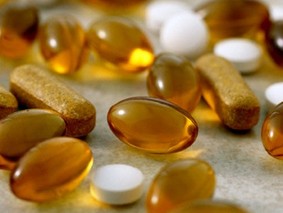 Stress is practically unavoidable in our fast paced culture. It triggers a hormonal pathway and cascade that places excess demands on the body’s nutrient and vitamin stores over and above of what is required for normal function. As the fall season starts its a good time to prepare for the higher amounts of stress that come with the cooler weather. The following article with highlight the top, “must-have” nutrients that are essential to boost your body’s ability to deal with stress. They can be used preventatively to help you cope with higher amounts of stress Vitamin C The adrenal gland is responsible for producing hormones in response to stressful events. It has the highest concentration of vitamin C in the body. Here it is used as a cofactor for the production of epinephrine and steroid hormones. During times of stress the demand for the production of these hormones increases so the body naturally has a higher demand for vitamin C. It also plays a key role in the formation of neurotransmitters that regulate mood and brain function. One randomized, placebo controlled trial looked at 120 healthy adults and if vitamin C supplementation had any effect of their ability to handle stress. The results showed that those people that took 3 gram of vitamin daily had a lower blood pressure, their cortisol levels recovery quicker and felt less “stressed.”1 Vitamin B5 Vitamin B5 (also called Pantothenic acid) is considered a key factor in supporting adrenal function. It has long been known that adrenal function is compromised in the deficiency of B5.4 Pantothenic acid plays a key part in producing Coenzyme A. The adrenal glands require CoA for the synthesis of the powerful hormones through which the body adapts to stress. Stress can therefore seriously deplete the body of vitamin B5, and in-turn supplemental B5 can help correct this stress-induced deficiency. There is evidence that the administration of Pantethine (the active form of Pantothenic acid) in several experimental animal models appears to enhance adrenal gland function.2 This would translate to a more balanced secretion of the hormones such as cortisol, which is required for the body’s stress response. A human study using Pantethine showed a lower rise in urinary cortisol metabolites after simulating a stressful situation which suggests that pantethine can down-regulate excess of cortisol production.3 It is very important to note that B5 should be supplemented in the Panthethine form since it is much more efficient at producing coenzyme A than regular pantothenic acid. Magnesium Magnesium is involved in over 300 biochemical processes in the body. One of its most important functions is that it plays a key role is producing energy. This makes it vitality important for all cellular functions and processes, especially the ability to maintain function in times of stress. Magnesium helps maintain normal muscle and nerve function, keeps heart rhythm regular, supports a healthy immune system, and keeps bones strong. The problem with this essential mineral is that most people do not have sufficient levels for optimal health. A gradual depletion of nutrients from our soils has left many vegetables with lower levels of magnesium. In addition, various common medications, such as proton pump inhibitors and blood pressure medications, further deplete magnesium levels. Unfortunately, stress is also a very powerful factor that leads to magnesium depletion.4 When a person in under stress one of the first signs they experience is tense muscles, especially in the neck and shoulders. In muscle tissue and blood vessels, magnesium causes relaxation while calcium levels increases muscle tone. Adequate levels of magnesium are required to offset stress related muscle tightness. A number of studies have shown that deficient levels of magnesium decrease resistance to stress related changes in blood pressure or heart rhythm. It seems that adequate magnesium levels are protective against increased risk of cardiovascular damage.5 Summary In times of stress the body’s need for essential minerals is greatly increased. The excess production of hormones and neurotransmitters require extra amounts of vitamin C, pantethine, and magnesium. Combined with a balanced diet, active lifestyle, adaptogenic herbs and a high potency multi vitamin or b-complex, the aforementioned nutrients can have a potent effect in helping the body deal with stressful situations. IV infusions are also a TURBO way to get these nutrient. If you need an extra boost to kick a cold or References 1) Brody S, Preut R, Schommer K, Schürmeyer TH. A randomized controlled trial of high dose ascorbic acid for reduction of blood pressure, cortisol, and subjective responses to psychological stress. Psychopharmacology (Berl). 2002 Jan;159(3):319-24. Epub 2001 Nov 20. 2) Kosaka C, Okida M, Kaneyuki T, et al. Action of pantethine on the adrenal cortex of hypophysectomized rats. Horumon To Rinsho 1973;21:517-525. [Article in Japanese] 3) Onuki M, Suzawa A. Effect of pantethine on the function of the adrenal cortex. 2. Clinical experience using pantethine in cases under steroid hormone treatment. Horumon To Rinsho 1970;18:937-940. 4) Burford-Mason AP. Magensium. Scienctific Evidence for MSK, Bariatric and Sports Nutrition. CRC Press 2006 5) Seelig MS. Consequences of magnesium deficiency on the enhancement of stress reactions; preventive and therapeutic implications (a review). J Am Coll Nutr. 1994 Oct;13(5):429-46.
1 Comment
|
Welcome To My Blog
My goal is to post thought-provoking and informative articles so you can learn and apply the latest news from the world of natural health. Feel free to post comments and start a conversation. Stay tuned to my twitter and facebook feeds for the latest posts.
Archives
December 2015
|

 RSS Feed
RSS Feed

